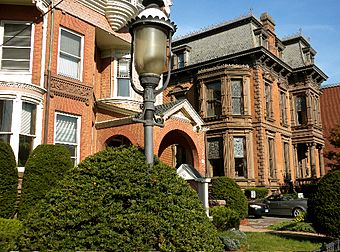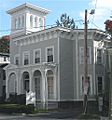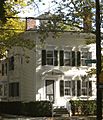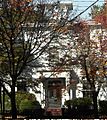Orange Street Historic District facts for kids
Quick facts for kids |
|
|
Orange Street Historic District
|
|

436 and 444 Orange St.
|
|
| Location | Roughly bounded by Whitney Ave., State, Eagle & Trumbull Sts., New Haven, Connecticut |
|---|---|
| Area | 125 acres (51 ha) |
| Built | 1830 |
| Architect | Multiple |
| Architectural style | Greek Revival, Italianate, Queen Anne |
| NRHP reference No. | 85002314 |
| Added to NRHP | September 12, 1985 |
The Orange Street Historic District is a special neighborhood in New Haven, Connecticut. It's located in the East Rock part of the city. This area is famous for its many old houses. These homes were built between about 1830 and 1900. They show off many different styles from the 1800s.
This district was added to the U.S. National Register of Historic Places in 1985. This means it's a very important historical area. At that time, it had 546 buildings that help tell its story.
Contents
Discovering the Orange Street Historic District
The Orange Street Historic District is a large area. It's roughly bordered by Orange, Cottage, Eagle, State, and Audubon Streets. Most of the buildings here are homes. They are made of wood. The district has many different architectural styles. You can see homes from the 1820s to the early 1900s.
A Journey Through Time
New Haven started as a busy port city. In the 1820s, the Farmington Canal opened. This helped new industries grow. More people moved to the city. The Orange Street area began to develop a lot during this time. It was located near the New Haven Green.
Around 1850, New Haven became a big railroad center. This made its industries even bigger. The Orange Street area kept growing. It expanded into what used to be farmland. This is why you see so many different types of old homes here.
Amazing Architecture Styles
The houses in the Orange Street Historic District are like a museum of old building styles. You can see many different designs.
- Greek Revival: These homes look like ancient Greek temples. They often have tall columns and grand entrances.
- Italianate: These houses might remind you of Italian villas. They often have low-pitched roofs, wide eaves, and tall, narrow windows. Some even have towers!
- Queen Anne: These homes are very decorative. They often have turrets, towers, fancy porches, and different textures on their walls.
- Gothic Revival: You might see pointed arches and steep roofs on these homes. They look a bit like miniature castles or churches.
- Colonial Revival: These houses look back to the styles of early American homes. They often have simple, classic designs.
Each house tells a part of New Haven's history. Walking through the district is like stepping back in time.
Gallery
-
Gothic cottage, 12 Lincoln St. (about 1840).
-
Timothy Lester House (1846), 431 Orange St., towered Italian villa.
-
Italian villa, 400 Orange St. (about 1857).
 | William M. Jackson |
 | Juan E. Gilbert |
 | Neil deGrasse Tyson |













